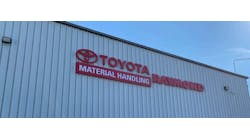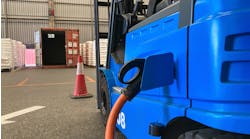One business that does quite well in a weakened economy is short-term lift truck rental. While the recession was at its peak and companies were most nervous about business conditions, they held off on any long-term capital spending commitments. So even though short-term rental ends up being more expensive than leasing when it becomes long-term rental, at least it offered buyers the security of a budgetary dump switch should things go south.
U.S. lift truck OEMs don’t think that will happen this year. Although they have wistful memories of 2006 when sales hit an all time high of 190,000 units, they also remember 2009 when sales dropped 55%. Not only did short-term rentals take a hit, but so did after-market service and parts.
As I write this, lift truck manufacturers are making money again. The latest numbers from the Industrial Truck Association show sales were back up to 145,000 units last year, and based on the first quarter of this year sales are trending 13% higher than 2011. Of course this is an election year, and anything could happen before those results are in.
But this being MH&L’s annual lift truck issue, and with buyers and sellers in a more optimistic mood, we thought we’d focus our coverage more on the successful use of these vehicles than on the latest bells and whistles. That’s the strategy OEMs and dealers are taking in sales, too, according to Martin Boyd, vice president of product planning, marketing and training for Toyota Material Handling USA, Inc. (www.toyotaforklift.com). After what their industry has been through in the last couple years, sellers realize that long-term success for them and their customers doesn’t necessarily translate into the purchase of more lift trucks. It will require providers getting smarter about the tasks for which lift trucks—and their operators—are applied.
“The recent economic downturn showed a lot of companies what they really were,” says Boyd. “It brought a lot of inefficiencies to the surface. Companies are now looking to equipment dealers for insights and recommendations in helping their businesses run smoother.”
Now dealers and OEMs are touring customer facilities—not only looking at lift trucks, but seeing how companies operate; how materials and work flows; how people move. As a result, material handling system users and vendors are working together on the optimizing time, space and labor.
“If the customer can take an operator off a tow tractor or lift truck and reassign them to a different area of the facility where they’re actually adding value to product, they can change the product movement process in a way that saves costs and in the end will make them more competitive,” Boyd adds.
That may entail automation, and as you’ll read in our cover story, turning a lift truck into an automated guided vehicle can be a realistic option for some users. Of course OEMs have been similarly enthusiastic about fuel cell-powered vehicles for years but that segment has yet to go beyond its niche categorization.
But Andy Marsh, CEO of Plug Power (www.plugpower.com), providers of fuel cell power units for lift trucks, says his business is focused on practicality too, and their existing customer base is proving that paybacks are a reality.
“In an older facility, where you’re converting the electrical infrastructure and battery facility to a hydrogen based system, the payback can be in as little as six months to as long as 18 months—depending on the facility’s number of trucks and operational hours,” he says. “With customers like Walmart, P&G and Kroger, it’s the economics that drove them to move to our technology.”
Of course establishing a reliable fueling infrastructure will determine whether that population of pioneers can generate buzz in the lift truck market’s mainstream. The era of bells and whistles is over.
Follow me on Twitter @TomAndel.


